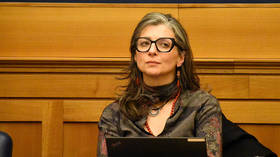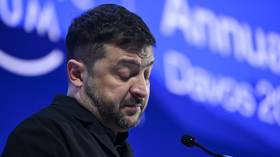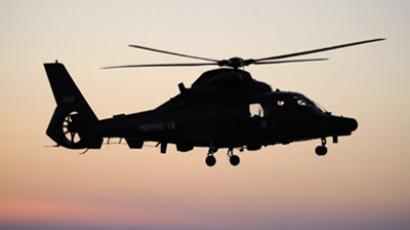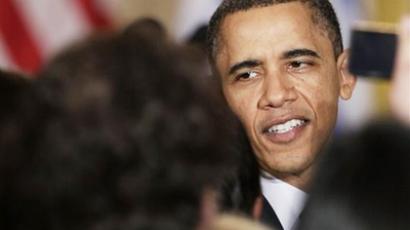“The coalition is going too far in Libya” - Russian envoy to NATO
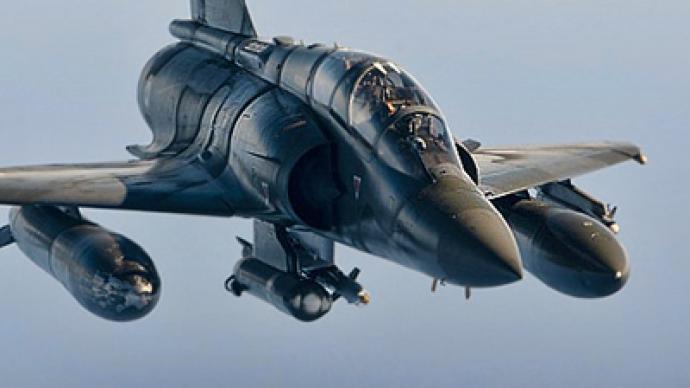
“It's not up to NATO to decide the future of Libya. If someone in NATO thinks otherwise, they are deeply mistaken,” Moscow's envoy Dmitry Rogozin shared his concerns after a Russia-NATO meeting.
After the talks at the alliance's headquarters in Brussels, Dmitry Rogozin told RT the coalition is going too far in Libya.Moscow has many questions about how the UN Security Council’s resolution is being carried out.“During our meeting with NATO officials today, we demanded that the UN Security Council be fully informed about the actions of the alliance in Libya at all times," said Dmitry Rogozin. "The coalition has taken sides. It's only targeting Gaddafi's forces, including those that aren't in direct action against the rebels. We have reports of air strikes against convoys far from the front line. This is a far cry from the UN Security Council resolution.”Rogozin expressed deep concern over the creative interpretation of the UN Security Council’s resolution, as some countries have effectively turned it into an approval for ground operations. But the resolution speaks only about a naval blockade enforcing the arms embargo, and enforcing a no-fly zone to prevent the bombing of civilians. “Moscow has many questions about how the UN Security Council’s resolution is being carried out,” said Rogozin. “First of all, there are reports that civilians have been killed in the air strikes. This is odd if you consider the message of the resolution, which says that the foreign forces’ actions should protect civilians. So it’s hard to comprehend how you can protect civilians by killing them.”
Dmitry Rogozin's media briefing in Brussels
Colleagues, let me brief you on the results of the NATO-Russia Council ambassadorial meeting which reviewed two issues: the situation in Libya, and preparation for the ministerial meeting of the NATO-Russia Council scheduled for April 15 in Berlin.It is peculiar to our today's discussion of Libya that the conference on the Libyan issue starts in London immediately after this meeting. The secretary general, who was chairing today's NATO-Russia Council, is going to the UK capital with the decision of NATO to assume control over the operation in Libya, in accordance with UN Security Council Resolution 1973. And certainly, Russia's standing on this issue was very significant in this discussion.The Russian Federation noted the motivation of the Security Council in voting on Resolution 1973. This motivation is plain and obvious: it is protection lives of the Libyan civilians amid the civil conflict, and the use of force by the coalition which is willing to control the settlement of this conflict. We drew close attention of our colleagues to the reports from the conflict zone about numerous victims among Libya's civil population. We believe this information has to be confirmed by proper and reliable sources. And if this information proves correct, this would contradict the meaning of the Resolution 1973, which was adopted precisely to avoid such numbers of victims. There's another thing I noted to my colleagues in the NATO-Russia Council, and I'd like to draw your attention to this fact, too. The resolution adopted by the UN Security Council implies that the process should develop hand in hand with the political reconciliation of the sides. Unless we implement political and diplomatic measures, making them the priority for the international community's attitude toward the situation in Libya, it will be practically impossible to resolve any other issue by other means. Also, there's something else we want to draw to the attention of our partners in the NATO-Russia Council. NATO, as the organization that has assumed responsibility for the implementation of the provisions of the UN Security Council resolutions, had the right to do so, according to the resolution. We noted to NATO that it's important to refrain from any creative interpretation of this resolution's provisions. It is written in a very clear diplomatic language. Primarily, it implies strict limitations, according to international law, on the implementation of this resolution on Libya. Particularly, it implies an embargo on arms supplies to Libya, and the “no-fly zone” over Libya. It doesn't imply anything else. Therefore, we'd like to request that one refrain from unnecessary creativity in their attitude toward this resolution and its implementation. Russia and NATO have a serious partnership which, as we hope, will be consolidated upon the decisions of the Russia-NATO Summit in Lisbon. Russia, being a permanent member state of the UN Security Council which actively participates in the Security Council voting on all Libya-related issues, and being one of NATO's key partners in the North Atlantic region, has the right to count on NATO's total transparency in its operation in Libya. Particularly, this relates to its plans, military planning and specific actions. I welcome the position of our partners which, according to their statements, do understand the meaning of everything said by Russia – i.e. the Russian delegation to the North Atlantic Treaty Organization. We proceed from the fact that we will be heard, and understood correctly; and that we will have access to all objective information regarding the intentions and particular actions by those who actively participate in the implementation of Resolution 1973.We also count on our partners to study closely and to take good note of everything that was said regarding the situation in Libya by Russia Foreign Minister Sergei Lavrov yesterday during a joint press conference with one of the invitees to Moscow. We also hope that the statement of Russia’s foreign minister will be heard in full detail rather than selectively, including what he said about the need for a selective use of force and only in conformity with the provisions of the resolution of the UN Security Council. As for the second point that concerns the convocation of the Russia-NATO Council’s ambassadorial meeting at the level of ministers of foreign affairs in Berlin on April 15, the ambassadors have decided on the agenda. Even though the meeting will be an informal one, we have chalked out such matters as discussing the state of affairs in the negotiations on antimissile defenses in the European continent, and strengthening our interaction in securing the fight against terrorists in public transit systems. The latter is linked to the fact that the latest terrorist attacks, which have shaken public opinion both in Russia and the Atlantic alliance member countries, were mostly directed against passengers in transit. We believe that this is so far a vulnerable spot in the civil infrastructure, which should be protected through a joint effort. We also intend to bring up for discussion by the foreign ministers some issues connected with cooperation on Afghanistan, in particular as regards the implementation of [understandings] to deliver spare parts for Russian-made helicopters utilized by the Afghan National Army, the delivery of which was contemplated within the framework of the Russia-NATO Council’s Trust Fund. We welcomed the German-announced contribution to the fund and we agree that it is Berlin that should be the lead nation within the fund. The lead nation is in charge of everyday business. It is a tradition that a trust-fund member-state should assume, let us say, the coordinating functions for the benefit of joint work. In this connection, we hope that Berlin is not an accidental venue for discussing our understandings within the Russia-NATO Council to build up the trust fund on helicopters for the Afghan security services and the Afghan National Army. Where implementation of the European antimissile defense project is concerned, I informed my NATO counterparts that an inter-agency working group for interaction with NATO in the antimissile defense area had been finally formed under the presidential staff on orders from the president of the Russian Federation and started its operations. As the president’s special representative, I am the head of that inter-agency group. We are studying closely the latest proposals that have been submitted by our US colleagues. We must state nevertheless that no particular headway has been made so far on the European AMB, this in connection with the fact that our European colleagues are withholding legal guarantees that the contemplated system would not be directed against Russia’s strategic nuclear potential.I think that the Berlin meeting and the upcoming contacts, including ones at the top level, between the Russian Federation and the United States of America, let alone the ministerial meeting at the level of defense ministers of the Russia-NATO Council in June, will give us some more or less convincing and impressive answers to questions we ask about the political aspects and the technical characteristics of the NATO antimissile defense system being developed in Europe. One way or another, I would like to say that both the situation in Libya and around it and the negotiations on creating a European antimissile defense system are, under the conditions of equitable cooperation between the Russian Federation and its Western partners, two halves of the same litmus paper that enable us to test the sincerity and firmness of the intentions of our partners to fully implement the decisions of the Russia-NATO Council’s Lisbon Summit on our countries prospectively attaining a strategic partnership.



